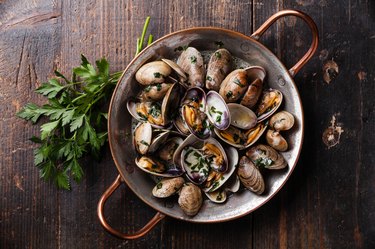
Clams, part of the mollusk family, live along the sandy shores from Maine to South Carolina. Like most shellfish, clams don't stay fresh for long after harvesting. Freezing raw clams is a common method of preserving this tasty shellfish. Freezing cooked clams isn't unsanitary or harmful, but the freezing cooked clams makes the meat tougher and more rubbery than its freshly cooked relatives.
Sanitiation
Video of the Day
Raw shellfish carry vibrio bacteria, an organism which can make healthy people ill and potentially kill someone with an impaired immune system. The sanitary precautions for other types of raw meat also apply to raw clams, including separate utensils and disinfecting the cutting board when finished. Always wash your clams and hands thoroughly before and after shucking.
Video of the Day
Cooking and Shucking
Cooking clams properly before freezing the meat means less preparation when they thaw. Shucking describes the process of separating the clam meat from its shell. After prying open the shell with a knife, separate the meat by running the blade between the clam and the its attached shell side. Cook the clam meat inside a simmering stir-fry pan. Now is the time to add seasoning or butter. Re-cooking frozen clams makes the meat even more chewy and tough than it already will be.
Freezing in a Container
Before freezing, drain the cooked clam meat of any extra liquid, butter or marinade inside the pan. Empty the clam meat in a freezer-ready plastic container until 1/2 inch of head space remains. Head space is necessary for the meat to expand while freezing, but too much heads pace invites freezer burn.
Freezing in a Bag
After draining the excess moisture, pour the cooked clam meat into a freezer-ready plastic bag with a sturdy zip seal. Choose a large bag with several inches of headroom between the clam meat and the zip seal. A tightly packed bag of clam meat will leak juice through the seal while freezing. Expel any excess air from the bag by pushing the head space flat and holding it down while zipping the seal. Removing extra oxygen from inside the bag before freezing the clam meat prevents freezer burn and premature spoilage. Properly frozen clam meat will last up to three months at 32 degrees F or indefinitely in 0 degrees F.